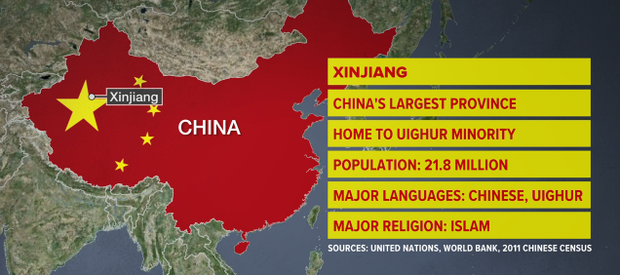Report points to the co-opting of ethnic Chinese living outside China and targeting by intelligence services
By Owen Churchill

The Chinese Communist Party monitors individuals and groups operating abroad that it sees as dissenters. Pictured, Chinatown in New York. By Owen Churchill

China’s ruling Communist Party is pursuing an aggressive, covert infiltration of US educational and social institutions to quell dissenting voices and strengthen its soft power overseas, according to a report written for an influential US congressional body.
The Chinese Communist Party (CCP) is seeking “to co-opt ethnic Chinese individuals and communities living outside China”, said the report, published on Friday by the US-China Economic and Security Review Commission.
Methods include threatening to imprison family members of Uygur people living in the US unless they agree to spy for the Communist Party, the report said.
At the same time, “a number of other key affiliated organisations guided by China’s broader United Front strategy conduct influence operations targeting foreign actors and states,” said the paper, referring to the United Front Work Department, a government body charged with strengthening adherence to the ruling party both within and outside China.
 Uygurs and their supporters march near the United Nations headquarters in New York in March.
Uygurs and their supporters march near the United Nations headquarters in New York in March.
The Chinese Communist Party (CCP) is seeking “to co-opt ethnic Chinese individuals and communities living outside China”, said the report, published on Friday by the US-China Economic and Security Review Commission.
Methods include threatening to imprison family members of Uygur people living in the US unless they agree to spy for the Communist Party, the report said.
At the same time, “a number of other key affiliated organisations guided by China’s broader United Front strategy conduct influence operations targeting foreign actors and states,” said the paper, referring to the United Front Work Department, a government body charged with strengthening adherence to the ruling party both within and outside China.
 Uygurs and their supporters march near the United Nations headquarters in New York in March.
Uygurs and their supporters march near the United Nations headquarters in New York in March.
The research paper, titled “China’s Overseas United Front Work: Background and Implications for the United States”, is intended to inform further action by the commission, which reports to Congress with recommendations on legislative action related to China.
The commission’s report highlights the scrutiny to which the CCP subjects overseas Chinese, not only as carriers of soft power but also as resources for the monitoring of anti-party individuals and groups operating abroad.
The paper pointed to Xi Jinping’s declaration at the CCP’s National Congress last year that the party would “maintain extensive contacts with overseas Chinese nationals, returned Chinese and their relatives and unite them so that they can join our endeavours to revitalise the Chinese nation”.
The publication comes amid rising international scrutiny of China’s detention of up to 1 million Uygurs in re-education camps in its East Turkestan colony.
The commission’s report highlights the scrutiny to which the CCP subjects overseas Chinese, not only as carriers of soft power but also as resources for the monitoring of anti-party individuals and groups operating abroad.
The paper pointed to Xi Jinping’s declaration at the CCP’s National Congress last year that the party would “maintain extensive contacts with overseas Chinese nationals, returned Chinese and their relatives and unite them so that they can join our endeavours to revitalise the Chinese nation”.
The publication comes amid rising international scrutiny of China’s detention of up to 1 million Uygurs in re-education camps in its East Turkestan colony.
Attention from the global community was renewed recently when a UN panel grilled Chinese representatives on the subject at a hearing on racial discrimination around the world.
As the CCP – in conjunction with Chinese state media – scrambles to discredit such concerns, scores of Uygurs living in the US are being targeted by Chinese intelligence services, according to the report.
Intelligence services are “threatening to send their families still in East Turkestan to internment camps, or keep them there, if the former do not agree to spy for China”, said the report, which draws extensively from media reports and interviews with experts on China’s overseas presence.

Megha Rajagopalan, a reporter for BuzzFeed News in Beijing, had her application for a visa renewal denied.
As the CCP – in conjunction with Chinese state media – scrambles to discredit such concerns, scores of Uygurs living in the US are being targeted by Chinese intelligence services, according to the report.
Intelligence services are “threatening to send their families still in East Turkestan to internment camps, or keep them there, if the former do not agree to spy for China”, said the report, which draws extensively from media reports and interviews with experts on China’s overseas presence.

Megha Rajagopalan, a reporter for BuzzFeed News in Beijing, had her application for a visa renewal denied.
Megha Rajagopalan – a journalist who has reported on human rights abuses in East Turkestan and who was forced to leave China after her visa renewal application was recently denied – told the commission that the harassment of Uygurs living outside China was consistent with the United Front’s objective to quash voices of dissent against the ruling party.
The commission’s report also draws attention to the subversion role played by the Chinese Students & Scholars Association (CSSA), which has established campus organisations for Chinese students abroad.
A number of CSSAs have denied government affiliation, but not all: the group at the University of Tennessee, for example, lists the Chinese embassy in the US as one of its sources of funding.
Last year, after the University of California at San Diego invited the Dalai Lama to speak at its commencement ceremony, the CSSA at the university spoke out in protest and said it was coordinating with the Chinese consulate on the matter.
There are signs that the US government is growing wary of the CCP’s influence and surveillance tactics detailed in the report.
The US military budget for 2019, recently signed into law, includes a stipulation that no Pentagon funding can be granted to educational institutions that allow Confucius Institute study programmes.

US President Donald Trump signs into law a defence budget that forbids the Pentagon from funding educational institutions that allow Confucius Institute study programmes.
Operating under the auspices of the CCP, Confucius Institutes offer language and cultural courses to non-Chinese students.
A number of CSSAs have denied government affiliation, but not all: the group at the University of Tennessee, for example, lists the Chinese embassy in the US as one of its sources of funding.
Last year, after the University of California at San Diego invited the Dalai Lama to speak at its commencement ceremony, the CSSA at the university spoke out in protest and said it was coordinating with the Chinese consulate on the matter.
There are signs that the US government is growing wary of the CCP’s influence and surveillance tactics detailed in the report.
The US military budget for 2019, recently signed into law, includes a stipulation that no Pentagon funding can be granted to educational institutions that allow Confucius Institute study programmes.

US President Donald Trump signs into law a defence budget that forbids the Pentagon from funding educational institutions that allow Confucius Institute study programmes.
Operating under the auspices of the CCP, Confucius Institutes offer language and cultural courses to non-Chinese students.
They offered instead a sterilised, party-approved picture of Chinese culture that proactively glosses over contentious subjects like Tibet.
Acknowledging that move by US lawmakers, the commission’s report said that improved transparency – regarding, for instance, US universities’ relationships with Confucius Institutes – and oversight “hold great promise for countering the most subversive and anti-democratic of the CCP’s influence operations.”
The US-China Economic and Security Review Commission has also played a role in efforts to prevent the transfer of advanced technologies to China through acquisitions.
Earlier this year, the body recommended expanded authority for the Committee on Foreign Investment in the United States (CFIUS) to review – and, if necessary, halt – Chinese firms’ acquisition of US companies if technologies developed or produced by the company could be adapted for military purposes.
The recommendation helped advance the Foreign Investment Risk Review Modernisation Act (FIRRMA), which provides greater powers to CFIUS and is now US law.
Acknowledging that move by US lawmakers, the commission’s report said that improved transparency – regarding, for instance, US universities’ relationships with Confucius Institutes – and oversight “hold great promise for countering the most subversive and anti-democratic of the CCP’s influence operations.”
The US-China Economic and Security Review Commission has also played a role in efforts to prevent the transfer of advanced technologies to China through acquisitions.
Earlier this year, the body recommended expanded authority for the Committee on Foreign Investment in the United States (CFIUS) to review – and, if necessary, halt – Chinese firms’ acquisition of US companies if technologies developed or produced by the company could be adapted for military purposes.
The recommendation helped advance the Foreign Investment Risk Review Modernisation Act (FIRRMA), which provides greater powers to CFIUS and is now US law.



